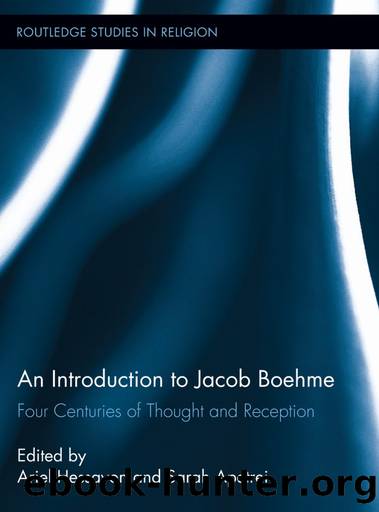An Introduction to Jacob Boehme: Four Centuries of Thought and Reception by Ariel Hessayon & Sarah Apetrei

Author:Ariel Hessayon & Sarah Apetrei [Hessayon, Ariel]
Language: eng
Format: azw3
Tags: Religion, Philosophy, Mariology, Christian Theology, Mysticism
ISBN: 9781135014285
Publisher: Routledge
Published: 2013-08-28T23:00:00+00:00
Joseph Trappâs dismissal of Boehme as an âilliterate enthusiast,â from whom one could only expect âfalsehood and frenzy,â stung Law to especially fulsome praise of the âTeutonic Philosopher.â Jacob Boehme âmay be placed among those who had received the highest Measures of Light, Wisdom, and Knowledge from Above. He was no more a human writer, spoke no more from Opinion, Conjecture, or Reason, in what he published to the world, than St. John did, when he put his Revelation into writing.â Unsurprisingly, Law is quick to qualify the comparison with the New Testament, and he does so with a hermeneutic claim that places Boehme in relation to orthodox Christianity. The shoemakerâs distinctive mission was to âopenâ up the âdeepest Ground,â and reveal the innermost necessity of Christianity, as witnessed to in Scripture and taught by the Church. In no sense had Boehme anything âto alter, or add, either in the Form, or Doctrine of Religion.â He neither innovated nor completed because he âhad no new Truths of Religion to Propose to the World.â55
If the distinction between âaddingâ and âopeningâ is one prong of Lawâs defense of Boehmeâs orthodox credentials, the other is his stress on the performative character of Boehmeâs writing against any appearance of encouraging theological or philosophical speculation. Academicus, the intellectual fall-guy in Lawâs dialogues, exemplifies this distinction. His excitement at understanding something of Theophilusâs expositions is routinely slapped down as a desire for intellectual satisfaction and control. Boehme, Law argues, never sought to satisfy any speculative urge, nor to inform or build up knowledge. All his writings intend is to provoke the reader to open herself to âthe Birth of . . . Light and Love.â Intellectual wrangling, or even the simple desire for explanation, misses the entire purpose and character of these books: âto help anyone to work with his Brain for clear Notions, and rational Conceptions, of what he has written, is helping him to do and be that, which all his Works, from the beginning to the End, absolutely declare against, as contrary to the whole Nature and End of them.â56
At one level, Law wants to head off in advance an assessment of Boehme from the perspective of theological controversy. He is also, though, returning to his critique of dualismâin this case, that of reason and desire or, in characteristically eighteenth-century terms, rationality and enthusiasm. There is a more subtle point than his critics would allow behind Lawâs sometimes vigorous and deliberately provocative dismissal of the productions of reason. Theology seen as a body of truths that may be entertained, considered, and argued about, theology as the product of âreason,â is only possible because the desire to know has fallen apart from the desire for the good. Thus, in the internal war between desire and desire, of the divided will, knowing can insulate against loving, and intellectual stimulation can be mistaken for spiritual renewal. The truth of Boehmeâs writings, according to Law, lies in that transformation that is the new birth of the will,
Download
This site does not store any files on its server. We only index and link to content provided by other sites. Please contact the content providers to delete copyright contents if any and email us, we'll remove relevant links or contents immediately.
Fearfully and Wonderfully Made by Philip Yancey & Paul Brand(588)
Christian Ethics by Wilkens Steve;(574)
Numbers by Ronald B. Allen(505)
The World from 1450 To 1700 by Wills John E.;(501)
Christian Ethics: An Introduction to Biblical Moral Reasoning by Wayne Grudem(481)
How to Read Slowly by James W. Sire(464)
God and the Multiverse by Victor J. Stenger(449)
Morality by Jonathan Sacks(434)
Monastic Archaeology by Unknown(408)
The Disabled Church by Rebecca F. Spurrier;(398)
Jesus: A New Vision by Whitley Strieber(375)
Critical Writings by Joyce James;(368)
Death of the Doctor by Unknown(367)
Amish Grace by Donald B. Kraybill & Nolt Steven M. & Weaver-Zercher David L(366)
Redeeming Sociology by Vern S. Poythress(366)
The Technological System by Jacques Ellul(355)
Children of Lucifer; The Origins of Modern Religious Satanism by Ruben van Luijk(354)
The Catholic Case for Trump by Austin Ruse(335)
The Church in the Early Middle Ages by G.R. Evans(334)
